Directors' Duties and Breaches: A Case Study of ASIC v Flugge (2017)
VerifiedAdded on 2021/01/02
|8
|2566
|86
Report
AI Summary
This report provides an in-depth analysis of the ASIC v Flugge (No 2) [2017] VSC 117 case, examining the breaches of directors' duties under the Corporations Act 2001 (Cth). The case involves Trevor Flugge, the chairman of Australian Wheat Board Limited (AWB), and Peter Geary, the Group General Manager, and their alleged breaches related to payments made to the Iranian government. The report details the case introduction, the breaches of directors' duties under sections 180 and 181 of the Corporations Act, and the court's decision, which found Flugge in breach of section 180. It discusses the relevance and impact of the decision, highlighting the importance of directors' adherence to their duties and the consequences of non-compliance. The report also examines the business judgment rule and its application in this case, providing a comprehensive overview of the legal and practical implications of the court's findings. The report concludes with a summary of the key findings and their significance for corporate governance in Australia.
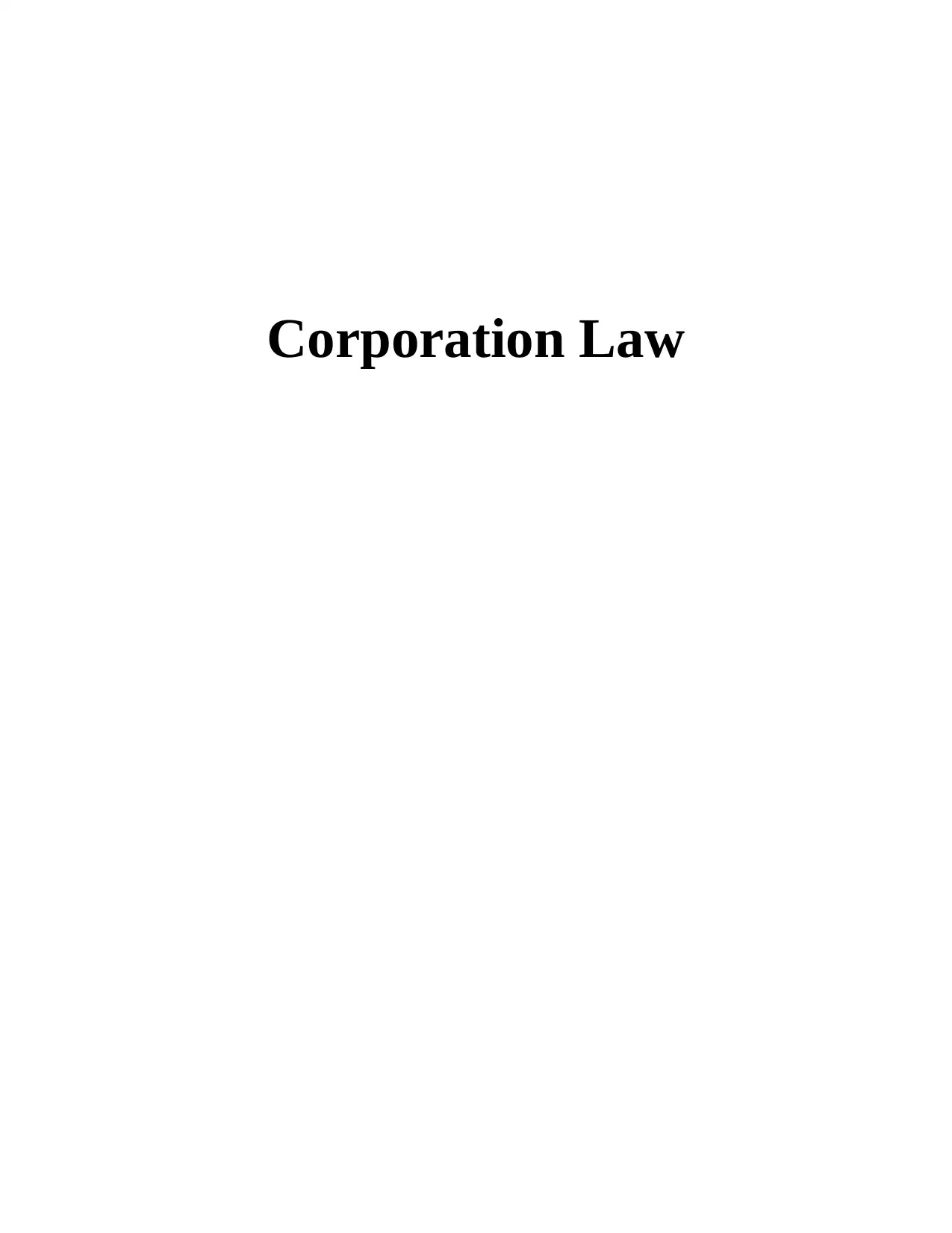
Corporation Law
Paraphrase This Document
Need a fresh take? Get an instant paraphrase of this document with our AI Paraphraser
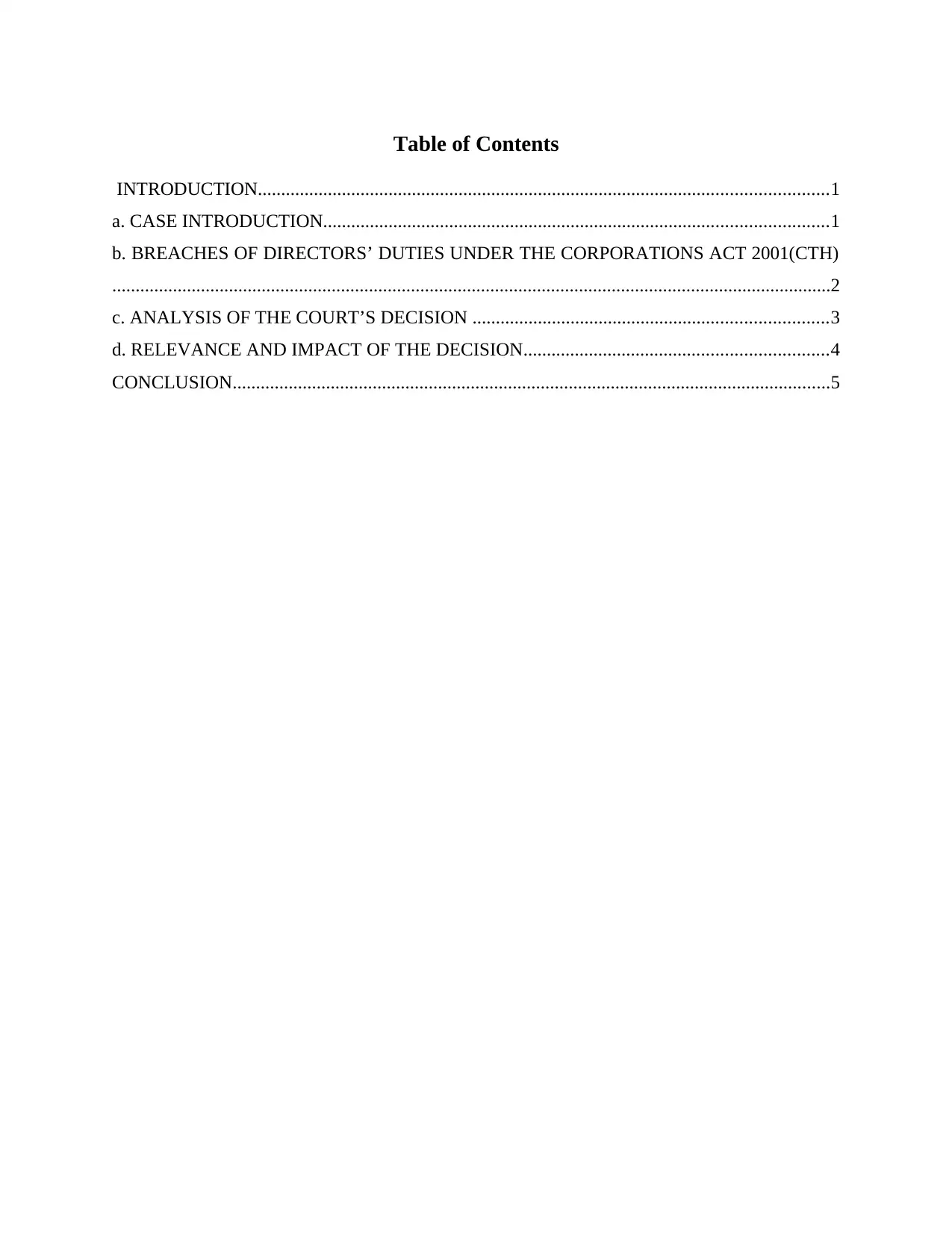
Table of Contents
INTRODUCTION..........................................................................................................................1
a. CASE INTRODUCTION............................................................................................................1
b. BREACHES OF DIRECTORS’ DUTIES UNDER THE CORPORATIONS ACT 2001(CTH)
..........................................................................................................................................................2
c. ANALYSIS OF THE COURT’S DECISION ............................................................................3
d. RELEVANCE AND IMPACT OF THE DECISION.................................................................4
CONCLUSION................................................................................................................................5
INTRODUCTION..........................................................................................................................1
a. CASE INTRODUCTION............................................................................................................1
b. BREACHES OF DIRECTORS’ DUTIES UNDER THE CORPORATIONS ACT 2001(CTH)
..........................................................................................................................................................2
c. ANALYSIS OF THE COURT’S DECISION ............................................................................3
d. RELEVANCE AND IMPACT OF THE DECISION.................................................................4
CONCLUSION................................................................................................................................5
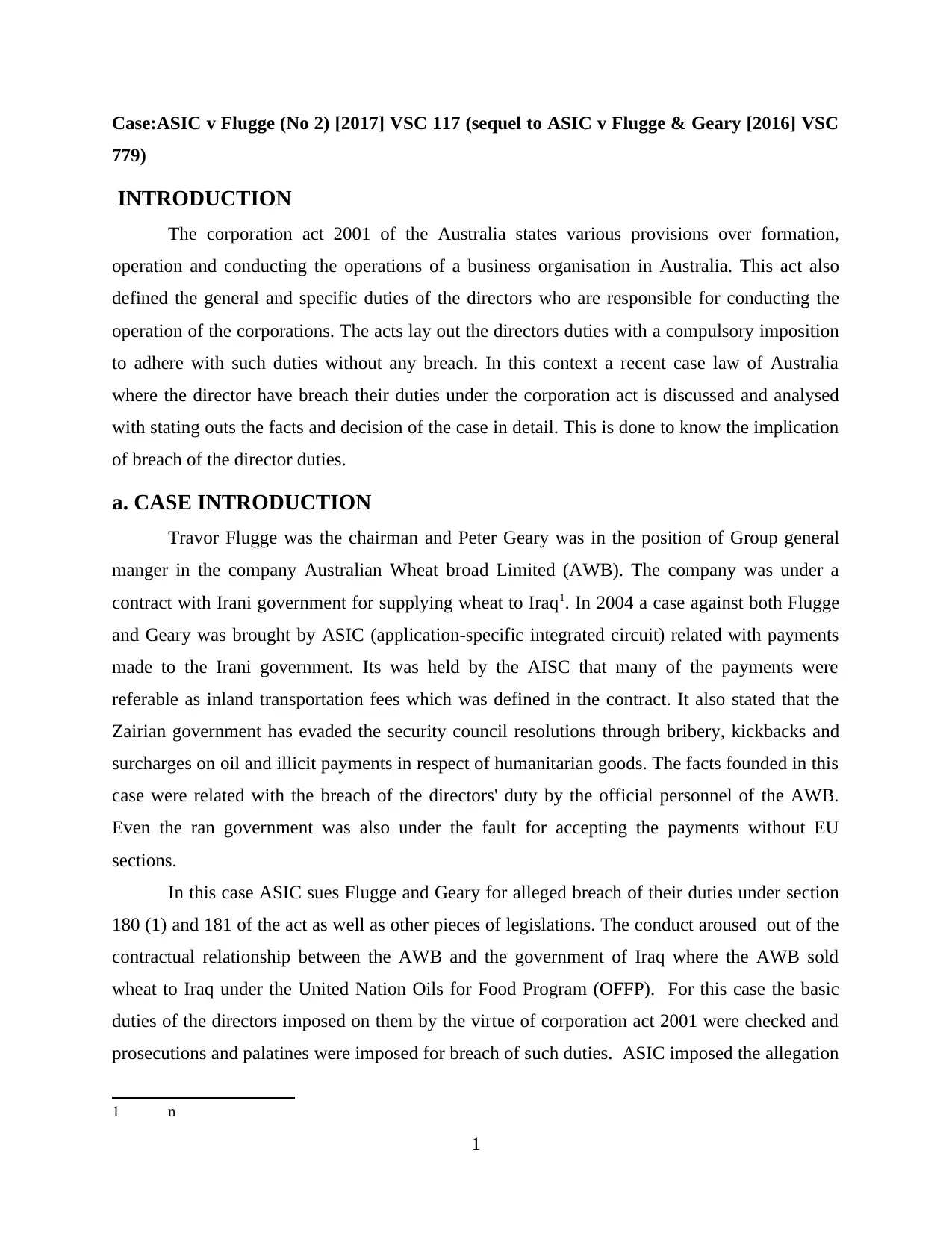
Case:ASIC v Flugge (No 2) [2017] VSC 117 (sequel to ASIC v Flugge & Geary [2016] VSC
779)
INTRODUCTION
The corporation act 2001 of the Australia states various provisions over formation,
operation and conducting the operations of a business organisation in Australia. This act also
defined the general and specific duties of the directors who are responsible for conducting the
operation of the corporations. The acts lay out the directors duties with a compulsory imposition
to adhere with such duties without any breach. In this context a recent case law of Australia
where the director have breach their duties under the corporation act is discussed and analysed
with stating outs the facts and decision of the case in detail. This is done to know the implication
of breach of the director duties.
a. CASE INTRODUCTION
Travor Flugge was the chairman and Peter Geary was in the position of Group general
manger in the company Australian Wheat broad Limited (AWB). The company was under a
contract with Irani government for supplying wheat to Iraq1. In 2004 a case against both Flugge
and Geary was brought by ASIC (application-specific integrated circuit) related with payments
made to the Irani government. Its was held by the AISC that many of the payments were
referable as inland transportation fees which was defined in the contract. It also stated that the
Zairian government has evaded the security council resolutions through bribery, kickbacks and
surcharges on oil and illicit payments in respect of humanitarian goods. The facts founded in this
case were related with the breach of the directors' duty by the official personnel of the AWB.
Even the ran government was also under the fault for accepting the payments without EU
sections.
In this case ASIC sues Flugge and Geary for alleged breach of their duties under section
180 (1) and 181 of the act as well as other pieces of legislations. The conduct aroused out of the
contractual relationship between the AWB and the government of Iraq where the AWB sold
wheat to Iraq under the United Nation Oils for Food Program (OFFP). For this case the basic
duties of the directors imposed on them by the virtue of corporation act 2001 were checked and
prosecutions and palatines were imposed for breach of such duties. ASIC imposed the allegation
1 n
1
779)
INTRODUCTION
The corporation act 2001 of the Australia states various provisions over formation,
operation and conducting the operations of a business organisation in Australia. This act also
defined the general and specific duties of the directors who are responsible for conducting the
operation of the corporations. The acts lay out the directors duties with a compulsory imposition
to adhere with such duties without any breach. In this context a recent case law of Australia
where the director have breach their duties under the corporation act is discussed and analysed
with stating outs the facts and decision of the case in detail. This is done to know the implication
of breach of the director duties.
a. CASE INTRODUCTION
Travor Flugge was the chairman and Peter Geary was in the position of Group general
manger in the company Australian Wheat broad Limited (AWB). The company was under a
contract with Irani government for supplying wheat to Iraq1. In 2004 a case against both Flugge
and Geary was brought by ASIC (application-specific integrated circuit) related with payments
made to the Irani government. Its was held by the AISC that many of the payments were
referable as inland transportation fees which was defined in the contract. It also stated that the
Zairian government has evaded the security council resolutions through bribery, kickbacks and
surcharges on oil and illicit payments in respect of humanitarian goods. The facts founded in this
case were related with the breach of the directors' duty by the official personnel of the AWB.
Even the ran government was also under the fault for accepting the payments without EU
sections.
In this case ASIC sues Flugge and Geary for alleged breach of their duties under section
180 (1) and 181 of the act as well as other pieces of legislations. The conduct aroused out of the
contractual relationship between the AWB and the government of Iraq where the AWB sold
wheat to Iraq under the United Nation Oils for Food Program (OFFP). For this case the basic
duties of the directors imposed on them by the virtue of corporation act 2001 were checked and
prosecutions and palatines were imposed for breach of such duties. ASIC imposed the allegation
1 n
1
⊘ This is a preview!⊘
Do you want full access?
Subscribe today to unlock all pages.

Trusted by 1+ million students worldwide
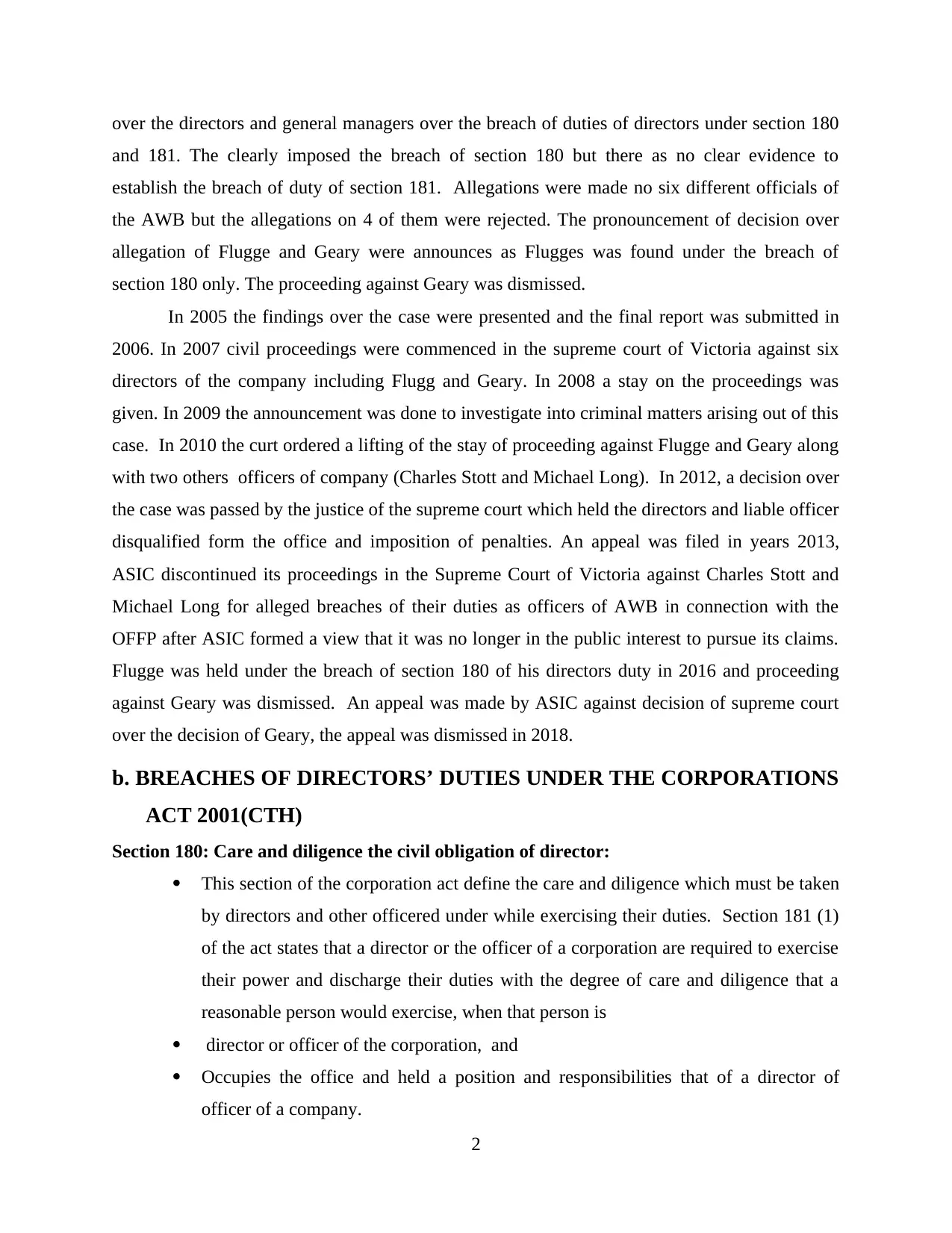
over the directors and general managers over the breach of duties of directors under section 180
and 181. The clearly imposed the breach of section 180 but there as no clear evidence to
establish the breach of duty of section 181. Allegations were made no six different officials of
the AWB but the allegations on 4 of them were rejected. The pronouncement of decision over
allegation of Flugge and Geary were announces as Flugges was found under the breach of
section 180 only. The proceeding against Geary was dismissed.
In 2005 the findings over the case were presented and the final report was submitted in
2006. In 2007 civil proceedings were commenced in the supreme court of Victoria against six
directors of the company including Flugg and Geary. In 2008 a stay on the proceedings was
given. In 2009 the announcement was done to investigate into criminal matters arising out of this
case. In 2010 the curt ordered a lifting of the stay of proceeding against Flugge and Geary along
with two others officers of company (Charles Stott and Michael Long). In 2012, a decision over
the case was passed by the justice of the supreme court which held the directors and liable officer
disqualified form the office and imposition of penalties. An appeal was filed in years 2013,
ASIC discontinued its proceedings in the Supreme Court of Victoria against Charles Stott and
Michael Long for alleged breaches of their duties as officers of AWB in connection with the
OFFP after ASIC formed a view that it was no longer in the public interest to pursue its claims.
Flugge was held under the breach of section 180 of his directors duty in 2016 and proceeding
against Geary was dismissed. An appeal was made by ASIC against decision of supreme court
over the decision of Geary, the appeal was dismissed in 2018.
b. BREACHES OF DIRECTORS’ DUTIES UNDER THE CORPORATIONS
ACT 2001(CTH)
Section 180: Care and diligence the civil obligation of director:
This section of the corporation act define the care and diligence which must be taken
by directors and other officered under while exercising their duties. Section 181 (1)
of the act states that a director or the officer of a corporation are required to exercise
their power and discharge their duties with the degree of care and diligence that a
reasonable person would exercise, when that person is
director or officer of the corporation, and
Occupies the office and held a position and responsibilities that of a director of
officer of a company.
2
and 181. The clearly imposed the breach of section 180 but there as no clear evidence to
establish the breach of duty of section 181. Allegations were made no six different officials of
the AWB but the allegations on 4 of them were rejected. The pronouncement of decision over
allegation of Flugge and Geary were announces as Flugges was found under the breach of
section 180 only. The proceeding against Geary was dismissed.
In 2005 the findings over the case were presented and the final report was submitted in
2006. In 2007 civil proceedings were commenced in the supreme court of Victoria against six
directors of the company including Flugg and Geary. In 2008 a stay on the proceedings was
given. In 2009 the announcement was done to investigate into criminal matters arising out of this
case. In 2010 the curt ordered a lifting of the stay of proceeding against Flugge and Geary along
with two others officers of company (Charles Stott and Michael Long). In 2012, a decision over
the case was passed by the justice of the supreme court which held the directors and liable officer
disqualified form the office and imposition of penalties. An appeal was filed in years 2013,
ASIC discontinued its proceedings in the Supreme Court of Victoria against Charles Stott and
Michael Long for alleged breaches of their duties as officers of AWB in connection with the
OFFP after ASIC formed a view that it was no longer in the public interest to pursue its claims.
Flugge was held under the breach of section 180 of his directors duty in 2016 and proceeding
against Geary was dismissed. An appeal was made by ASIC against decision of supreme court
over the decision of Geary, the appeal was dismissed in 2018.
b. BREACHES OF DIRECTORS’ DUTIES UNDER THE CORPORATIONS
ACT 2001(CTH)
Section 180: Care and diligence the civil obligation of director:
This section of the corporation act define the care and diligence which must be taken
by directors and other officered under while exercising their duties. Section 181 (1)
of the act states that a director or the officer of a corporation are required to exercise
their power and discharge their duties with the degree of care and diligence that a
reasonable person would exercise, when that person is
director or officer of the corporation, and
Occupies the office and held a position and responsibilities that of a director of
officer of a company.
2
Paraphrase This Document
Need a fresh take? Get an instant paraphrase of this document with our AI Paraphraser
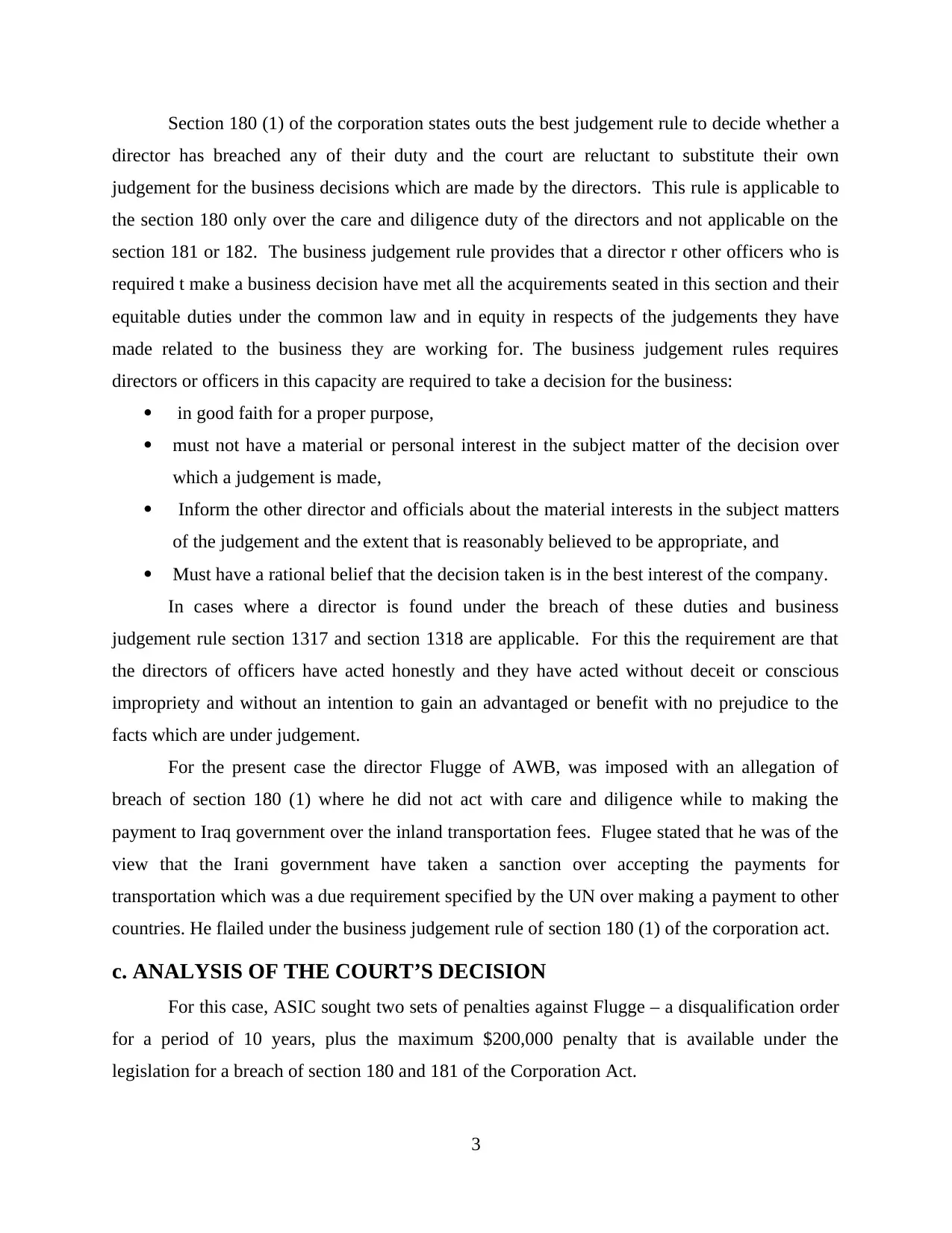
Section 180 (1) of the corporation states outs the best judgement rule to decide whether a
director has breached any of their duty and the court are reluctant to substitute their own
judgement for the business decisions which are made by the directors. This rule is applicable to
the section 180 only over the care and diligence duty of the directors and not applicable on the
section 181 or 182. The business judgement rule provides that a director r other officers who is
required t make a business decision have met all the acquirements seated in this section and their
equitable duties under the common law and in equity in respects of the judgements they have
made related to the business they are working for. The business judgement rules requires
directors or officers in this capacity are required to take a decision for the business:
in good faith for a proper purpose,
must not have a material or personal interest in the subject matter of the decision over
which a judgement is made,
Inform the other director and officials about the material interests in the subject matters
of the judgement and the extent that is reasonably believed to be appropriate, and
Must have a rational belief that the decision taken is in the best interest of the company.
In cases where a director is found under the breach of these duties and business
judgement rule section 1317 and section 1318 are applicable. For this the requirement are that
the directors of officers have acted honestly and they have acted without deceit or conscious
impropriety and without an intention to gain an advantaged or benefit with no prejudice to the
facts which are under judgement.
For the present case the director Flugge of AWB, was imposed with an allegation of
breach of section 180 (1) where he did not act with care and diligence while to making the
payment to Iraq government over the inland transportation fees. Flugee stated that he was of the
view that the Irani government have taken a sanction over accepting the payments for
transportation which was a due requirement specified by the UN over making a payment to other
countries. He flailed under the business judgement rule of section 180 (1) of the corporation act.
c. ANALYSIS OF THE COURT’S DECISION
For this case, ASIC sought two sets of penalties against Flugge – a disqualification order
for a period of 10 years, plus the maximum $200,000 penalty that is available under the
legislation for a breach of section 180 and 181 of the Corporation Act.
3
director has breached any of their duty and the court are reluctant to substitute their own
judgement for the business decisions which are made by the directors. This rule is applicable to
the section 180 only over the care and diligence duty of the directors and not applicable on the
section 181 or 182. The business judgement rule provides that a director r other officers who is
required t make a business decision have met all the acquirements seated in this section and their
equitable duties under the common law and in equity in respects of the judgements they have
made related to the business they are working for. The business judgement rules requires
directors or officers in this capacity are required to take a decision for the business:
in good faith for a proper purpose,
must not have a material or personal interest in the subject matter of the decision over
which a judgement is made,
Inform the other director and officials about the material interests in the subject matters
of the judgement and the extent that is reasonably believed to be appropriate, and
Must have a rational belief that the decision taken is in the best interest of the company.
In cases where a director is found under the breach of these duties and business
judgement rule section 1317 and section 1318 are applicable. For this the requirement are that
the directors of officers have acted honestly and they have acted without deceit or conscious
impropriety and without an intention to gain an advantaged or benefit with no prejudice to the
facts which are under judgement.
For the present case the director Flugge of AWB, was imposed with an allegation of
breach of section 180 (1) where he did not act with care and diligence while to making the
payment to Iraq government over the inland transportation fees. Flugee stated that he was of the
view that the Irani government have taken a sanction over accepting the payments for
transportation which was a due requirement specified by the UN over making a payment to other
countries. He flailed under the business judgement rule of section 180 (1) of the corporation act.
c. ANALYSIS OF THE COURT’S DECISION
For this case, ASIC sought two sets of penalties against Flugge – a disqualification order
for a period of 10 years, plus the maximum $200,000 penalty that is available under the
legislation for a breach of section 180 and 181 of the Corporation Act.
3
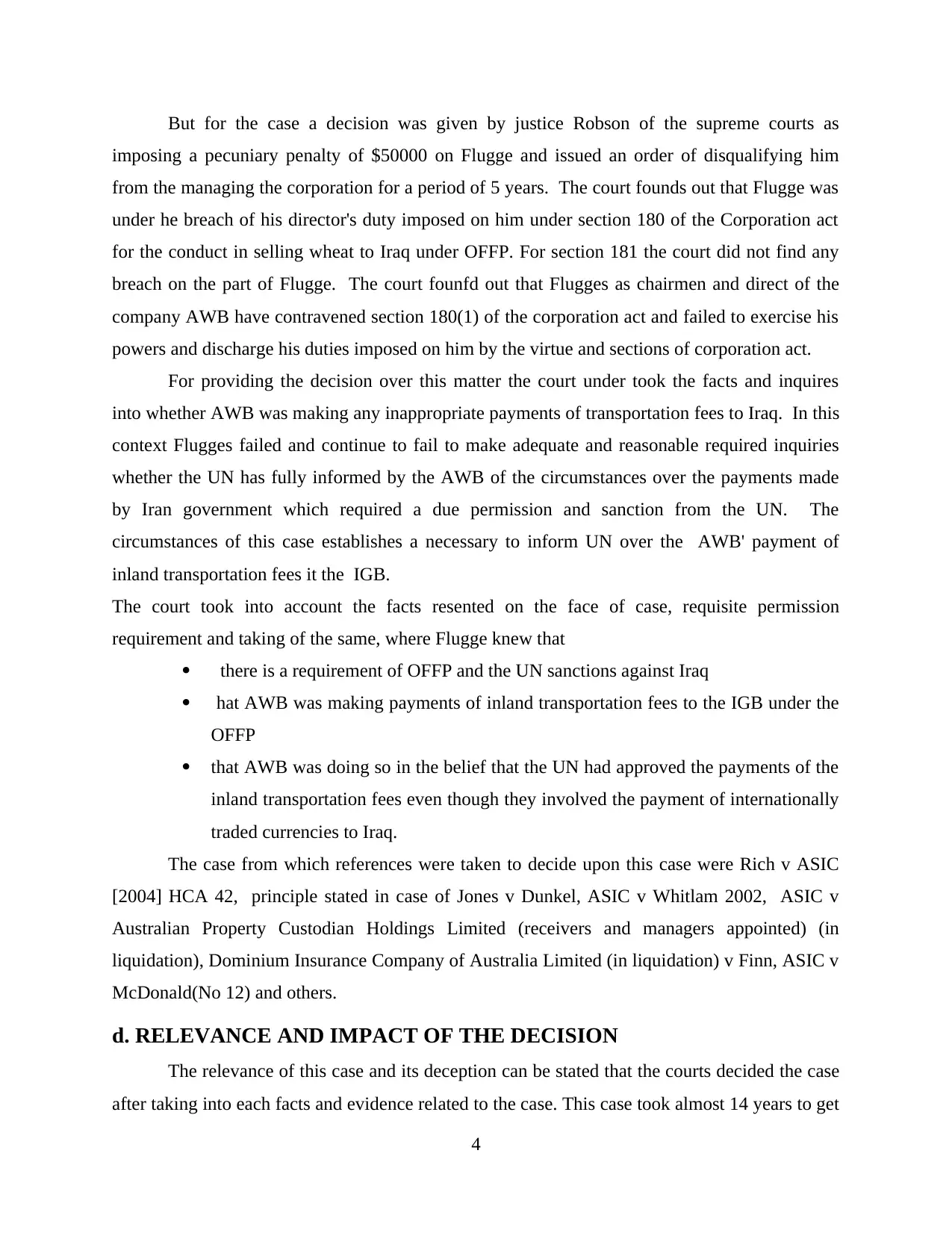
But for the case a decision was given by justice Robson of the supreme courts as
imposing a pecuniary penalty of $50000 on Flugge and issued an order of disqualifying him
from the managing the corporation for a period of 5 years. The court founds out that Flugge was
under he breach of his director's duty imposed on him under section 180 of the Corporation act
for the conduct in selling wheat to Iraq under OFFP. For section 181 the court did not find any
breach on the part of Flugge. The court founfd out that Flugges as chairmen and direct of the
company AWB have contravened section 180(1) of the corporation act and failed to exercise his
powers and discharge his duties imposed on him by the virtue and sections of corporation act.
For providing the decision over this matter the court under took the facts and inquires
into whether AWB was making any inappropriate payments of transportation fees to Iraq. In this
context Flugges failed and continue to fail to make adequate and reasonable required inquiries
whether the UN has fully informed by the AWB of the circumstances over the payments made
by Iran government which required a due permission and sanction from the UN. The
circumstances of this case establishes a necessary to inform UN over the AWB' payment of
inland transportation fees it the IGB.
The court took into account the facts resented on the face of case, requisite permission
requirement and taking of the same, where Flugge knew that
there is a requirement of OFFP and the UN sanctions against Iraq
hat AWB was making payments of inland transportation fees to the IGB under the
OFFP
that AWB was doing so in the belief that the UN had approved the payments of the
inland transportation fees even though they involved the payment of internationally
traded currencies to Iraq.
The case from which references were taken to decide upon this case were Rich v ASIC
[2004] HCA 42, principle stated in case of Jones v Dunkel, ASIC v Whitlam 2002, ASIC v
Australian Property Custodian Holdings Limited (receivers and managers appointed) (in
liquidation), Dominium Insurance Company of Australia Limited (in liquidation) v Finn, ASIC v
McDonald(No 12) and others.
d. RELEVANCE AND IMPACT OF THE DECISION
The relevance of this case and its deception can be stated that the courts decided the case
after taking into each facts and evidence related to the case. This case took almost 14 years to get
4
imposing a pecuniary penalty of $50000 on Flugge and issued an order of disqualifying him
from the managing the corporation for a period of 5 years. The court founds out that Flugge was
under he breach of his director's duty imposed on him under section 180 of the Corporation act
for the conduct in selling wheat to Iraq under OFFP. For section 181 the court did not find any
breach on the part of Flugge. The court founfd out that Flugges as chairmen and direct of the
company AWB have contravened section 180(1) of the corporation act and failed to exercise his
powers and discharge his duties imposed on him by the virtue and sections of corporation act.
For providing the decision over this matter the court under took the facts and inquires
into whether AWB was making any inappropriate payments of transportation fees to Iraq. In this
context Flugges failed and continue to fail to make adequate and reasonable required inquiries
whether the UN has fully informed by the AWB of the circumstances over the payments made
by Iran government which required a due permission and sanction from the UN. The
circumstances of this case establishes a necessary to inform UN over the AWB' payment of
inland transportation fees it the IGB.
The court took into account the facts resented on the face of case, requisite permission
requirement and taking of the same, where Flugge knew that
there is a requirement of OFFP and the UN sanctions against Iraq
hat AWB was making payments of inland transportation fees to the IGB under the
OFFP
that AWB was doing so in the belief that the UN had approved the payments of the
inland transportation fees even though they involved the payment of internationally
traded currencies to Iraq.
The case from which references were taken to decide upon this case were Rich v ASIC
[2004] HCA 42, principle stated in case of Jones v Dunkel, ASIC v Whitlam 2002, ASIC v
Australian Property Custodian Holdings Limited (receivers and managers appointed) (in
liquidation), Dominium Insurance Company of Australia Limited (in liquidation) v Finn, ASIC v
McDonald(No 12) and others.
d. RELEVANCE AND IMPACT OF THE DECISION
The relevance of this case and its deception can be stated that the courts decided the case
after taking into each facts and evidence related to the case. This case took almost 14 years to get
4
⊘ This is a preview!⊘
Do you want full access?
Subscribe today to unlock all pages.

Trusted by 1+ million students worldwide
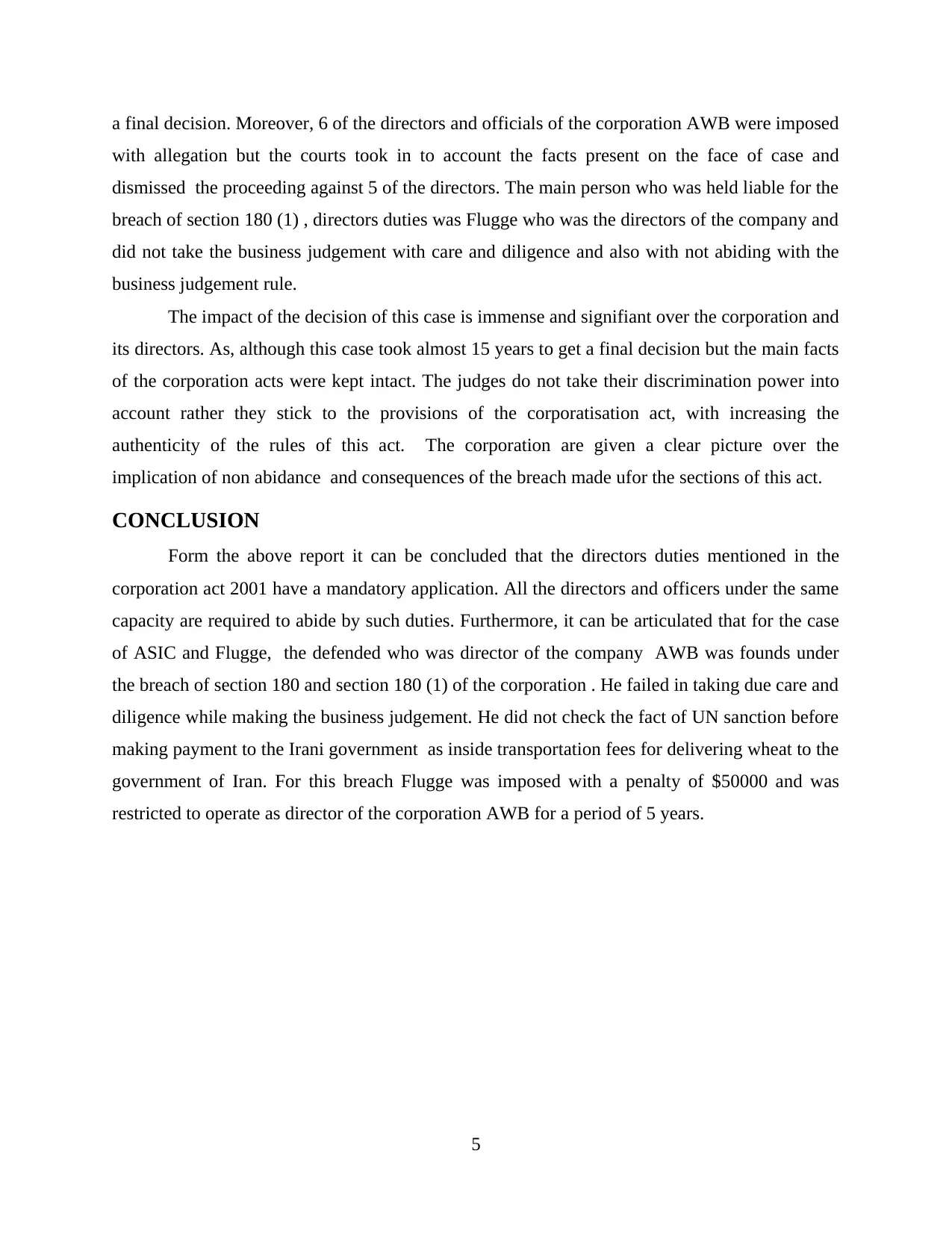
a final decision. Moreover, 6 of the directors and officials of the corporation AWB were imposed
with allegation but the courts took in to account the facts present on the face of case and
dismissed the proceeding against 5 of the directors. The main person who was held liable for the
breach of section 180 (1) , directors duties was Flugge who was the directors of the company and
did not take the business judgement with care and diligence and also with not abiding with the
business judgement rule.
The impact of the decision of this case is immense and signifiant over the corporation and
its directors. As, although this case took almost 15 years to get a final decision but the main facts
of the corporation acts were kept intact. The judges do not take their discrimination power into
account rather they stick to the provisions of the corporatisation act, with increasing the
authenticity of the rules of this act. The corporation are given a clear picture over the
implication of non abidance and consequences of the breach made ufor the sections of this act.
CONCLUSION
Form the above report it can be concluded that the directors duties mentioned in the
corporation act 2001 have a mandatory application. All the directors and officers under the same
capacity are required to abide by such duties. Furthermore, it can be articulated that for the case
of ASIC and Flugge, the defended who was director of the company AWB was founds under
the breach of section 180 and section 180 (1) of the corporation . He failed in taking due care and
diligence while making the business judgement. He did not check the fact of UN sanction before
making payment to the Irani government as inside transportation fees for delivering wheat to the
government of Iran. For this breach Flugge was imposed with a penalty of $50000 and was
restricted to operate as director of the corporation AWB for a period of 5 years.
5
with allegation but the courts took in to account the facts present on the face of case and
dismissed the proceeding against 5 of the directors. The main person who was held liable for the
breach of section 180 (1) , directors duties was Flugge who was the directors of the company and
did not take the business judgement with care and diligence and also with not abiding with the
business judgement rule.
The impact of the decision of this case is immense and signifiant over the corporation and
its directors. As, although this case took almost 15 years to get a final decision but the main facts
of the corporation acts were kept intact. The judges do not take their discrimination power into
account rather they stick to the provisions of the corporatisation act, with increasing the
authenticity of the rules of this act. The corporation are given a clear picture over the
implication of non abidance and consequences of the breach made ufor the sections of this act.
CONCLUSION
Form the above report it can be concluded that the directors duties mentioned in the
corporation act 2001 have a mandatory application. All the directors and officers under the same
capacity are required to abide by such duties. Furthermore, it can be articulated that for the case
of ASIC and Flugge, the defended who was director of the company AWB was founds under
the breach of section 180 and section 180 (1) of the corporation . He failed in taking due care and
diligence while making the business judgement. He did not check the fact of UN sanction before
making payment to the Irani government as inside transportation fees for delivering wheat to the
government of Iran. For this breach Flugge was imposed with a penalty of $50000 and was
restricted to operate as director of the corporation AWB for a period of 5 years.
5
Paraphrase This Document
Need a fresh take? Get an instant paraphrase of this document with our AI Paraphraser
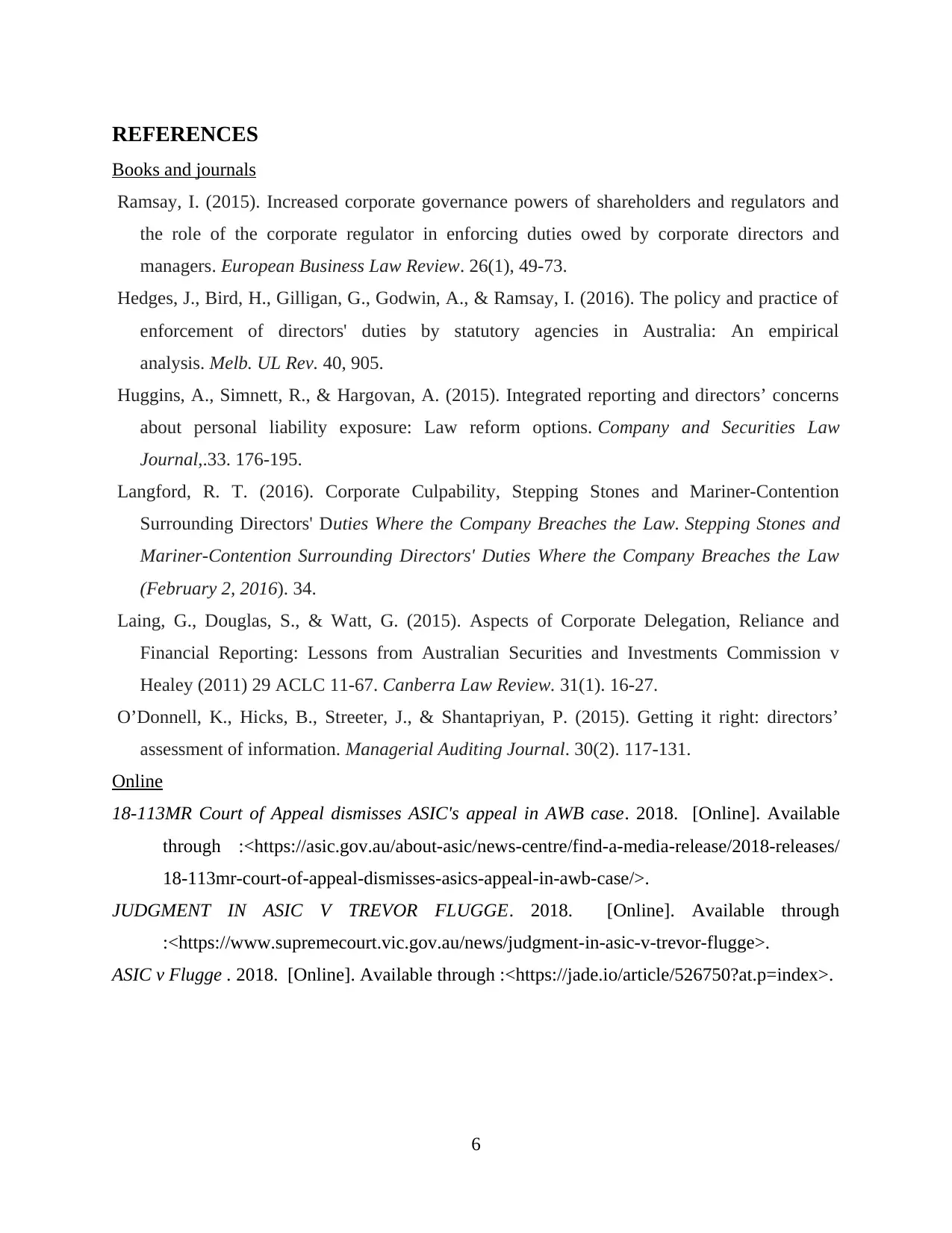
REFERENCES
Books and journals
Ramsay, I. (2015). Increased corporate governance powers of shareholders and regulators and
the role of the corporate regulator in enforcing duties owed by corporate directors and
managers. European Business Law Review. 26(1), 49-73.
Hedges, J., Bird, H., Gilligan, G., Godwin, A., & Ramsay, I. (2016). The policy and practice of
enforcement of directors' duties by statutory agencies in Australia: An empirical
analysis. Melb. UL Rev. 40, 905.
Huggins, A., Simnett, R., & Hargovan, A. (2015). Integrated reporting and directors’ concerns
about personal liability exposure: Law reform options. Company and Securities Law
Journal,.33. 176-195.
Langford, R. T. (2016). Corporate Culpability, Stepping Stones and Mariner-Contention
Surrounding Directors' Duties Where the Company Breaches the Law. Stepping Stones and
Mariner-Contention Surrounding Directors' Duties Where the Company Breaches the Law
(February 2, 2016). 34.
Laing, G., Douglas, S., & Watt, G. (2015). Aspects of Corporate Delegation, Reliance and
Financial Reporting: Lessons from Australian Securities and Investments Commission v
Healey (2011) 29 ACLC 11-67. Canberra Law Review. 31(1). 16-27.
O’Donnell, K., Hicks, B., Streeter, J., & Shantapriyan, P. (2015). Getting it right: directors’
assessment of information. Managerial Auditing Journal. 30(2). 117-131.
Online
18-113MR Court of Appeal dismisses ASIC's appeal in AWB case. 2018. [Online]. Available
through :<https://asic.gov.au/about-asic/news-centre/find-a-media-release/2018-releases/
18-113mr-court-of-appeal-dismisses-asics-appeal-in-awb-case/>.
JUDGMENT IN ASIC V TREVOR FLUGGE. 2018. [Online]. Available through
:<https://www.supremecourt.vic.gov.au/news/judgment-in-asic-v-trevor-flugge>.
ASIC v Flugge . 2018. [Online]. Available through :<https://jade.io/article/526750?at.p=index>.
6
Books and journals
Ramsay, I. (2015). Increased corporate governance powers of shareholders and regulators and
the role of the corporate regulator in enforcing duties owed by corporate directors and
managers. European Business Law Review. 26(1), 49-73.
Hedges, J., Bird, H., Gilligan, G., Godwin, A., & Ramsay, I. (2016). The policy and practice of
enforcement of directors' duties by statutory agencies in Australia: An empirical
analysis. Melb. UL Rev. 40, 905.
Huggins, A., Simnett, R., & Hargovan, A. (2015). Integrated reporting and directors’ concerns
about personal liability exposure: Law reform options. Company and Securities Law
Journal,.33. 176-195.
Langford, R. T. (2016). Corporate Culpability, Stepping Stones and Mariner-Contention
Surrounding Directors' Duties Where the Company Breaches the Law. Stepping Stones and
Mariner-Contention Surrounding Directors' Duties Where the Company Breaches the Law
(February 2, 2016). 34.
Laing, G., Douglas, S., & Watt, G. (2015). Aspects of Corporate Delegation, Reliance and
Financial Reporting: Lessons from Australian Securities and Investments Commission v
Healey (2011) 29 ACLC 11-67. Canberra Law Review. 31(1). 16-27.
O’Donnell, K., Hicks, B., Streeter, J., & Shantapriyan, P. (2015). Getting it right: directors’
assessment of information. Managerial Auditing Journal. 30(2). 117-131.
Online
18-113MR Court of Appeal dismisses ASIC's appeal in AWB case. 2018. [Online]. Available
through :<https://asic.gov.au/about-asic/news-centre/find-a-media-release/2018-releases/
18-113mr-court-of-appeal-dismisses-asics-appeal-in-awb-case/>.
JUDGMENT IN ASIC V TREVOR FLUGGE. 2018. [Online]. Available through
:<https://www.supremecourt.vic.gov.au/news/judgment-in-asic-v-trevor-flugge>.
ASIC v Flugge . 2018. [Online]. Available through :<https://jade.io/article/526750?at.p=index>.
6
1 out of 8
Related Documents
Your All-in-One AI-Powered Toolkit for Academic Success.
+13062052269
info@desklib.com
Available 24*7 on WhatsApp / Email
![[object Object]](/_next/static/media/star-bottom.7253800d.svg)
Unlock your academic potential
Copyright © 2020–2026 A2Z Services. All Rights Reserved. Developed and managed by ZUCOL.

![In-depth Case Study of ASIC v Flugge & Geary [2016] VSC 779 Law](/_next/image/?url=https%3A%2F%2Fdesklib.com%2Fmedia%2Fdocument%2Fpages%2F2024-07-29%2Fasic-v-flugge-geary-2016-vsc-779-a-case-study-on-directors-duties-page-2.webp&w=256&q=75)

![Detailed Analysis of the ASIC v Flugge (No 2) [2017] VSC 117 Case](/_next/image/?url=https%3A%2F%2Fdesklib.com%2Fmedia%2Fimages%2Fmt%2Fec4e36a8265a4eb19a3349d48f208406.jpg&w=256&q=75)

